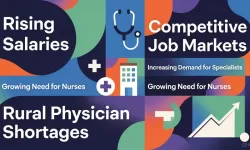Saddled with debt, newly minted doctors say compensation is the top factor they look for in a first employer; however, work-life balance, family and geography are increasingly influential as tenure lengthens
by Intelliworx
Compensation is back in style – at least for newly minted physicians looking for their first gig post-residency. That’s according to a joint report by Jackson Physician Search and the Medical Group Management Association (MGMA).
The report, based on a survey of physicians and hospital administrators, shows that the newest generation of physicians, Generation Z (1997-2012), also commonly referred to as Zoomers, care more about their compensation than Millennials (1981-1996).
More than three-quarters (76%) of new physician surveys said the top factor they look for in their first job after completing residency was compensation. This was followed by location (64%) and work-life balance in a distant third with just 38%.
This is at odds with conventional wisdom about Millennials, the largest generation since the Baby Boomers (1946-1964). Millennials watched their parents sacrifice their personal pursuits for work, only to lose much of the value of their retirement savings in the financial crisis of 2008-2009. As a result, Millennials generally place greater value on work-life balance.
If recruiting new physicians to your facility is important, then keeping track of such preferences is equally important for healthcare recruiting and human resources.
What physicians want from employers evolves over a career
The report also demonstrates how the predilections of individual physicians naturally change as their career progresses. This of course is logical as any number of life events, such as marriage and children, will change a person’s priorities.
-
The top factors resident physicians look for in a first job
Physicians polled were presented with a list of nearly 20 possible factors they might look for in a first job – after completing a residency or fellowship.
Here’s how the top five factors worked out:
- 50% said higher compensation;
- 37% said geography;
- 28% said family proximity (i.e. commute);
- 24% said career advancement; and
- 22% said flexible duty hours or part-time work.
The priority here for all physicians mirrors the priorities of newly minted doctors – though the percentages have shifted. Many new doctors have one thing in common: massive student loan debt.
“It’s not surprising that early-career physicians, often saddled with significant debt, prioritize compensation – especially amid inflation and higher costs of living,” according to the report. “Also predictable is the focus on location and their desire to be near support networks (e.g., family, friends, medical school).”
-
Top reasons physicians leave a first job
The staffing shortage in healthcare has many healthcare organizations focused on recruiting new providers. However, keeping the ones you already have on staff is just as critical. To that end, the survey asked why physicians leave.
Here’s how the top answers tallied up:
- 35% said the practice’s business model;
- 30% said higher compensation;
- 30% said geography;
- 30% said career advancement; and
- 25% said family proximity/commute.
It’s worth pointing out that another 25% cited “something else” at the end, which is tied for fifth place. This factor may indicate there is some variance – and that’s something HR should dig into to try to better identify these individual issues and develop a resolution.
Other studies we’ve reviewed, our own research, and recent market observations lead us to believe that a common denominator here is that physicians with experience tend to desire autonomy in how they practice.
Employers need to keep up with these changes or risk more severe talent shortages. The survey found that most physicians spend six years in their first job after residency. However, “among physicians who finished residency or fellowship in the past six years, the average drops below two years spent in their first job before leaving.”
That’s an important point because it signals “a disconnect between organizations and beginning physicians and/or increasing willingness among today’s beginning physicians to leave their first job in short order.”
Top factors physicians stay in their first job
While many physicians agree that compensation is their top priority in finding their first job – the reasons why they stay have much greater diversity.
Among the top five were as follows:
- 33% said higher compensation;
- 27% said geography;
- 25% said career advancement;
- 20% said family proximity/commute; and
- 24% said time off.
Yet several others, while not in the top five, followed close behind:
- 21% said spouse/partner career;
- 21% said organizational reputation;
- 20% said flexible duty hours; and
- 15% said practice business model.
If there’s an overall takeaway here, it’s that as physicians progress in their careers, many other competing factors influence their decision to move on or stay with a healthcare organization. The best way to keep tabs on it within your organization is to engage regularly with the physicians your organization employs and find out what’s important to them.
* * *
The full report includes responses from 410 administrators and physicians who participated and is freely available for download here: Early-career physician recruiting playbook (opens in PDF).
If you enjoyed this post, you might also like:
45% of healthcare providers will refuse a job offer if the recruiting experience is poor
![What physicians want from healthcare employers evolves over a career [survey] What physicians want from healthcare employers evolves over a career [survey]](https://intelliworxit.com/wp-content/uploads/2024/07/physicians-healthcare-employers-ahmed-05anl8hcj5w-unsplash-1920-1200x800.jpg)


